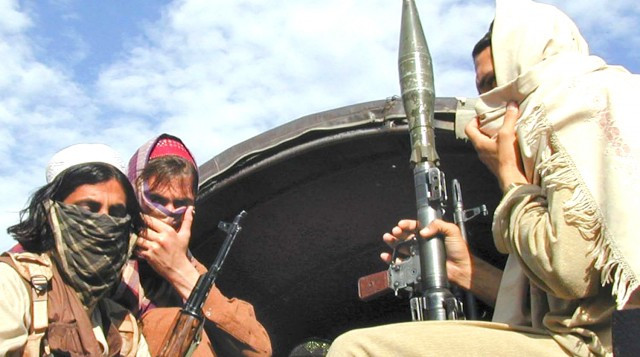Swat ATC condemns militant who publicly slaughtered a man to 120 years in prison
Court awards life imprisonment to militant commander for 2009 murder.

A militant commander was handed down a consecutive prison term of 120 years by the Anti-Terrorism Court (ATC) of Malakand Division in its first-ever verdict.
The man is also liable to pay a fine of Rs2 million.
Noorani Gul was a high-profile commander originally from Matta, which was a stronghold of the Swat chapter of the Tehreek-i-Taliban Pakistan (TTP). Gul was accused of publicly slaughtering Mohammad Iqbal, a class-IV public servant working in the Matta police station on July 17, 2009.
He was also suspected of being involved in anti-state activities such as bomb blasts targeting government buildings.
The court started functioning soon after peace was restored to Swat following an army operation.
Over 3,000 trials, including that of Tehrik-i-Nifaz-i-Shariat-i-Muhammadi (TNSM) Chief Sufi Muhammad, are still pending.
In its short order, ATC Judge Muhammad Asim sentenced Gul to life imprisonment under Section 302 of the Pakistan Penal Code (PPC), a fine of Rs1 million under PPC Section 364, another five-year imprisonment term under Section 457, a two-year imprisonment under Section 352, another three-year imprisonment under Section 148 and a fine of Rs1 million under Section 149.
Mixed reactions
The judgment was mostly welcomed in the small town, hungry for action against elements who had led the valley into chaos and violence.
“Although, it [the judgment] is an encouraging step and one that we had always demanded, the process should start from top to bottom,” said Ziauddin Yousafzai, president of the Global Peace Council in Swat. “Let them begin with Sufi Muhammad, Mullah Fazlullah and Muslim Khan.”
When asked what he felt would be the impact of the decision, Yousafzai said that extra-judicial killings can be avoided through powerful and effective court decisions such as this one.
“If top militants are tried and punished through courts of law, it will strengthen the judiciary.”
Mukhtiar Yousufzai, leader of the Swat Qaumi Jirga, also hailed the decision.
“Indeed these militants are criminals of the whole nation as they are involved in anti-state activities. Looking at his [Gul] history, he deserved a punishment even more severe than this one. But this is a really good decision if it is strictly followed.”
However, an emotional young man wasn’t impressed. “What is imprisonment for a man who slaughtered an innocent person in front of hundreds of people? I would have been happier if he were to be hanged in the same square,” he said.
The trials are seen as an important test of the government’s ability to bring militants to justice.
Published in The Express Tribune, March 19th, 2011.



















COMMENTS
Comments are moderated and generally will be posted if they are on-topic and not abusive.
For more information, please see our Comments FAQ